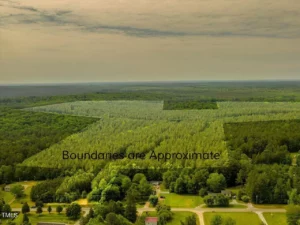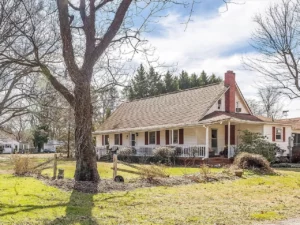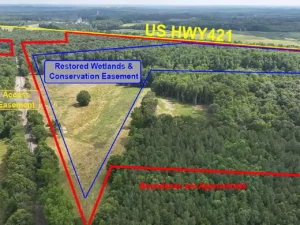North Carolina Land Sales Expert Eric Andrews explains why large tracts of land for sale almost never have a perc site.
Speaker 1: How come, there’s never a perk test on a large tract of land
Speaker 2: Sometimes there are, it’s not a never, but it’s rare. Sometimes there’s soils evaluations, which are important. So Chatham County rural properties rarely have municipal sewer. And so we’re dependent on private septics. Unfortunately when we have an inexperienced agent that doesn’t deal with land, they will often call us and it’s a 40, 50, or 100 acre track and they’ll go, “Do you have a perk test?” And we’re like, okay, how the hell am I supposed to know where someone wants to put a house on a 40, 50 or 100 acre track? That is not a smart question for the other agent to be asking. So we have an office policy, if it’s less than 20 acres, it’s mandatory for us to get a perk test. If it’s more than 20 acres, there’s no way we could possibly determine where someone would want to build their house.
So we don’t consider it necessary. One of the problems with internet and all of the RSS feeds off of MLS is that they will take that data, and even though it’s 40, 50 or 100 acres, it’ll say, “Perk test?” And it’ll say, “No.” And some of the websites will read that as does not perk, which is unfair to the property. But it’s ridiculous to get a large track to perk. If it’s a large track that has potential for a major subdivision. For instance, I just did 100 acre track on Man’s Chapel road that was clearly, when that property sold, it wasn’t going to be a farm, it wasn’t going to be an equestrian property. That was going to be for a major subdivision. I advised the sellers to make sure that they’re going to do a soils evaluation so we can determine how many lots can we get off of that property, and therefore I can determine a value better.
And Man’s Chapel is hit or miss. It has some good soil, it has some bad soil. The family that I represented, it did not want to put another 20, 40 grand into the property to get that soils evaluation, because that’s how much it would cost on 100 acre track. So they said, “No, Eric we’re going to sell it as is.” So when we went under contract, the buyers did it. And then we had a better perspective of what the value was. And we had to have another round of negotiation. So we started out at like 15, 17,000 an acre and ended up selling for 13,500 an acre because instead of being able to get 90 lots out of the subdivision, the bar was only able to get 55, so we had to have an adjustment price. But it does not make sense on a large acres track to have an individual park site.
Having an overall soils evaluation is a strong thing. Another thing that people need to realize too is on those 10 or 20 acre sites, we have to have a 5,000 square foot septic area for an initial septic system. And then the county requires us to have another 5,000 square feet for repair area. So a total of 10,000 square feet. A 10 acre track is approximately 500,000 square feet. So out of the 500,000, there’s 10,000 square feet on that entire property. The only place you can’t put your home is where those two 5000s are. You can put your house anywhere you want and then somehow get the effluent to the septic system, either by pump, or by gravity feed, or whatever. People are so concerned, “Oh, I need to move the septic site because that’s not where I want my house.” You can put your house wherever you want, you just can’t put it on top of that septic system. So agents and buyers need to know that on large tracks, we do not have individual perk permits, and to ask for such, makes you look silly.




